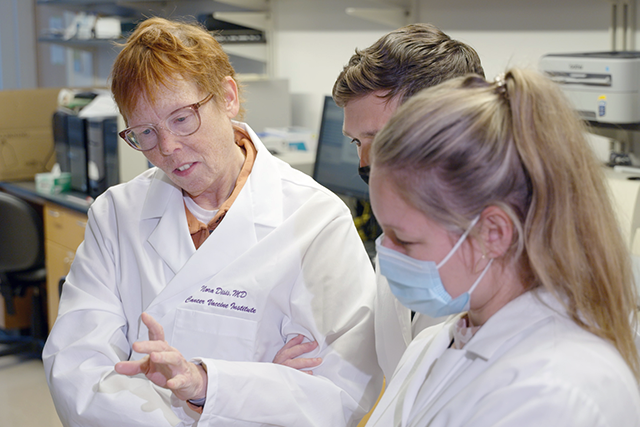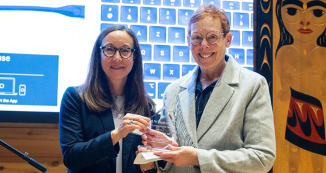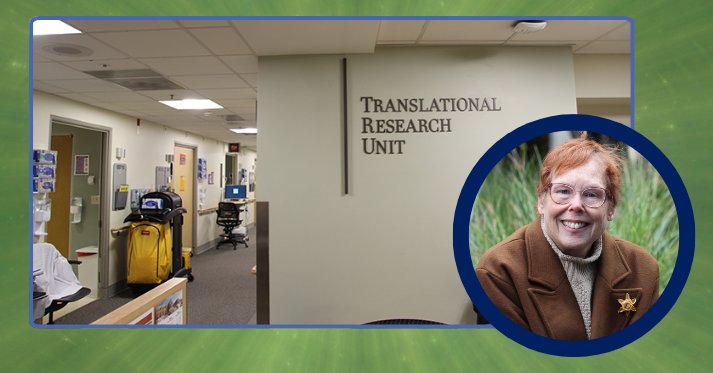
26 Oct New study says breast cancer vaccine safely generates anti-tumor immunity; ITHS PI Dr. Nora Disis lead author
An experimental vaccine against breast cancer safely generated a strong immune response to a key tumor protein, researchers from the University of Washington School of Medicine in Seattle report in a paper published by the journal JAMA Oncology. The findings suggest the vaccine may be able to treat different types of breast cancer.
“Because this was not a randomized clinical trial, the results should be considered preliminary, but the findings are promising enough that the vaccine will now be evaluated in a larger, randomized clinical trial,” said lead author Dr. Mary “Nora” L. Disis, a UW professor of medicine, Division of Medical Oncology, ITHS Principal Investigator, and director of the Cancer Vaccine Institute.
The phase I trial was designed to evaluate the safety of a vaccine that targets a protein called human epidermal growth factor receptor 2 (HER2) and to see if it generated an immune response to the protein.
HER2 is found on the surface of many cells, but in as many as 30% of breast cancers, HER2 is overproduced by as much as hundred times the amount seen in normal cells. These “HER2-positive” cancers tend to be more aggressive and more likely to recur after treatment, but the overproduction of HER2 also triggers an immune reaction that can be beneficial.
Specifically, patients with HER2-positive breast cancers who mount a type of immune response called cytotoxic — or cell-killing — immunity are less likely to see their cancer recur after treatment and have longer overall survival than those who do not mount such an immune response.
To stimulate this kind of response, Disis and her colleagues created a DNA vaccine. Unlike protein vaccines, which typically contain a protein or part of a protein that you want the immune system to target, DNA vaccines contain the DNA instructions for the target protein.

The trial results showed that the experimental tumor vaccine was “very safe,” said UW Medicine researcher Dr. Nora Disis. Photo by Randy Carnell / UW Medicine
Once injected, this DNA is taken up by cells at the injection site, which then start to produce the protein encoded in the vaccine’s DNA instructions. The cells will then present the protein to the immune system, a process more likely to generate a strong, cytotoxic immune response.
The vaccine used in this trial contained the DNA instructions for a part of the HER2 that is usually located within the cell. This intracellular portion is known to provoke stronger cytotoxic immune responses.
Sixty-six women who had metastatic cancer were enrolled in the study. All the women had completed a standard course of therapy and had either achieved complete remission or only had tumor remaining in their bone, which tends to grow slowly.
The study participants were divided into three groups with each participant recieving three injections. One group received three low-dose injections (10 mcg) of the vaccine, one group got three injections with an intermediate dose of 100 mcg, and one group, three injections of a high dose, 500 mcg. They also received the immune-stimulating drug granulocyte-macrophage colony-stimulating factor (GM-CSF), which promotes cytotoxic immunity.
The participants were then followed for three to 13 years (median follow-up was nearly 10 years). A long follow-up was important because HER2 is found on many other cell types. The researchers wanted to ensure the vaccination did not, over time, trigger an autoimmune response against other healthy tissues bearing HER2.
“The results showed that the vaccine was very safe,” Disis said. “In fact, the most common side effects that we saw in about half the patients were very similar to what you see with COVID vaccines: redness and swelling at the injection site and maybe some fever, chills and flu-like symptoms.”
The vaccine also successfully stimulated the desired cytotoxic immune response without triggering severe side effects, with strongest immune response appearing in patients who received the middle dose.
Although the study was not designed to see if the vaccine could slow or prevent progression of the cancer, the researchers noted that the participants have done much better than would be expected in patients with similar stages of breast cancer, about half of whom would be expected to die within 5 years of treatment.
“We’ve now followed these women for ten years and 80% of them are still alive,” Disis noted.
“If the results of the new randomized-controlled phase II trial of the vaccine are positive, it will be a strong signal for us to rapidly move forward to a definitive phase III trial,” Disis said. “I have high hopes that we’re close to having a vaccine that can effectively treat patients with breast cancer.”
This study was supported by the National Institutes of Health (R01 CA098761, TR002319, K23CA100690), the Helen B. Slonaker Endowed Professorship for Cancer Research and an American Cancer Society Clinical Professorship (CRP-15-106-01-408 LIB).
The list of researchers on the study who declared competing interests can be found in the JAMA Oncology paper, or journalists can contact our office for a copy: mediarelations@uw.edu
This news release was written by Michael McCarthy.
For details about UW Medicine, please visit http://uwmedicine.org/about.







